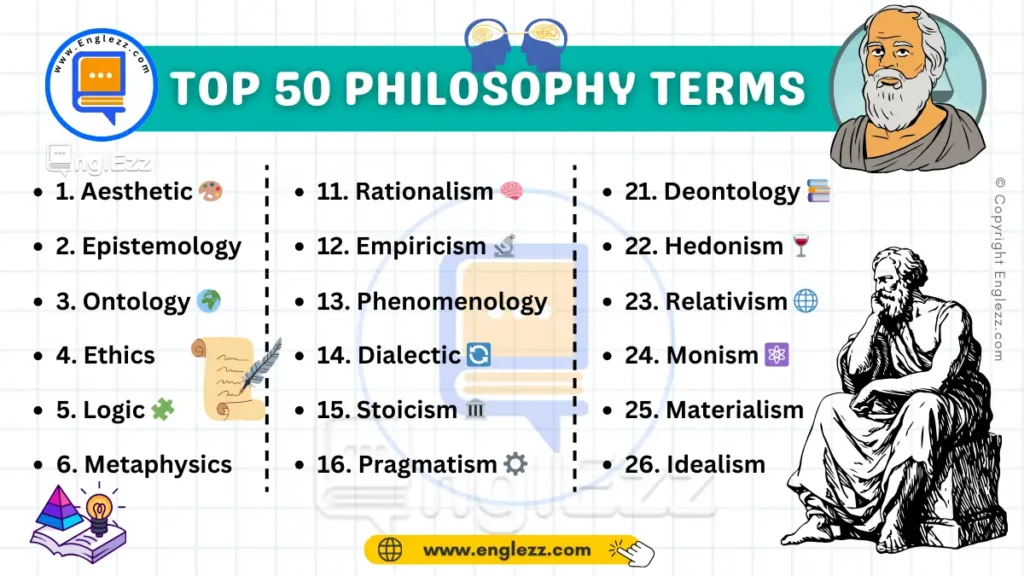Philosophy, the study of fundamental questions about existence, knowledge, and ethics, is rich with complex terminology that can often be confusing. For students and enthusiasts of philosophy, understanding these terms is crucial for grasping philosophical concepts and engaging in meaningful discussions. This blog post will demystify 50 of the most common philosophy terms in English. Each term is accompanied by a clear definition, phonetic transcription, and practical examples to illustrate its use.
Table of Contents
- 50 Most Common Philosophy English Terms Explained with Examples
- #1. Aesthetic 🎨
- #2. Epistemology 🧠
- #3. Ontology 🌍
- #4. Ethics 🌟
- #5. Logic 🧩
- #6. Metaphysics 🔮
- #7. Dualism ⚖️
- #8. Utilitarianism 🏆
- #9. Existentialism 🌌
- #10. Nihilism 💀
- #11. Rationalism 🧠
- #12. Empiricism 🔬
- #13. Phenomenology 🌟
- #14. Dialectic 🔄
- #15. Stoicism 🏛️
- #16. Pragmatism ⚙️
- #17. Absurdism 🎭
- #18. Hermeneutics 📜
- #19. Skepticism ❓
- #20. Absurd 🤔
- #21. Deontology 📚
- #22. Hedonism 🍷
- #23. Relativism 🌐
- #24. Monism ⚛️
- #25. Materialism 🏋️
- #26. Idealism 💭
- #27. Pragmatism 🧰
- #28. Theism ⛪
- #29. Atheism 🚫
- #30. Secularism 🌍
- #31. Determinism 🔗
- #32. Free Will 🗝️
- #33. Solipsism 🪞
- #34. Empiricism 🧪
- #35. Idealism 🌟
- #36. Holism 🌐
- #37. Relativism 🌎
- #38. Absurdism 🎲
- #39. Transcendentalism 🌄
- #40. Psychoanalysis 🧠
- #41. Egoism 🪞
- #42. Humanism 👫
- #43. Pantheism 🌲
- #44. Determinism 🕰️
- #45. Existentialism 🚶♂️
- #46. Utilitarianism 📈
- #47. Phenomenology 👀
- #48. Deconstruction 🏗️
- #49. Reductionism 🧬
- #50. Nihilism 🕳️
- Philosophy English Terms Explained with Examples
- Conclusion
50 Most Common Philosophy English Terms Explained with Examples
Whether you’re a philosophy major, a curious learner, or just someone looking to deepen your understanding of philosophical discussions, this guide will provide you with a comprehensive foundation. By breaking down these terms, we aim to make philosophy more accessible and engaging.
Dive into this list to enhance your philosophical vocabulary and improve your comprehension of this intriguing subject!
#1. Aesthetic 🎨
Definition: Concerned with beauty and the appreciation of art. Phonetic Transcription: /æˈstɛtɪk/
Examples:
- The aesthetic of the Renaissance era is characterized by its emphasis on realism and classical beauty.
- Understanding the aesthetic principles behind a painting can enhance your appreciation of the artwork.
#2. Epistemology 🧠
Definition: The branch of philosophy concerned with the theory of knowledge. Phonetic Transcription: /ɪˌpɪstəˈmɒlədʒi/
Examples:
- Epistemology explores questions such as “What is knowledge?” and “How do we know what we know?”
- In studying epistemology, philosophers examine the justification of belief and the nature of truth.
#3. Ontology 🌍
Definition: The branch of metaphysics dealing with the nature of being. Phonetic Transcription: /ɒnˈtɒlədʒi/
Examples:
- Ontology questions what entities exist and how they can be categorized.
- A debate in ontology might center on whether abstract concepts like numbers exist independently of human thought.
#4. Ethics 🌟
Definition: The philosophical study of morality and principles of right and wrong behavior. Phonetic Transcription: /ˈɛθɪks/
Examples:
- Ethics involves analyzing moral dilemmas to determine what is ethically right or wrong.
- A common topic in ethics is the examination of whether actions should be judged by their consequences or by their adherence to rules.
#5. Logic 🧩
Definition: The study of reasoning and argumentation. Phonetic Transcription: /ˈlɒdʒɪk/
Examples:
- Logic helps in constructing valid arguments and identifying fallacies.
- A logical argument follows a clear structure where the conclusion logically follows from the premises.
#6. Metaphysics 🔮
Definition: The branch of philosophy concerned with the fundamental nature of reality. Phonetic Transcription: /ˌmɛtəˈfɪzɪks/
Examples:
- Metaphysics explores concepts such as existence, objects, and their properties.
- A metaphysical discussion might involve questions about the nature of time and space.
#7. Dualism ⚖️
Definition: The belief that reality consists of two fundamentally different substances or principles. Phonetic Transcription: /ˈdjuːəlɪzəm/
Examples:
- Dualism in philosophy often refers to the mind-body problem, where the mind and body are seen as distinct entities.
- Cartesian dualism suggests that mental and physical substances are separate but interact with each other.
#8. Utilitarianism 🏆
Definition: The ethical theory that actions are right if they promote the greatest happiness for the greatest number. Phonetic Transcription: /ˌjuːtɪlɪˈtɛərɪənɪzəm/
Examples:
- Utilitarianism evaluates the morality of actions based on their outcomes and overall utility.
- A utilitarian approach might justify a policy if it leads to a greater overall benefit for society.
#9. Existentialism 🌌
Definition: A philosophical movement focusing on individual freedom, choice, and existence. Phonetic Transcription: /ˌɪɡzɪˈstɛnʃəlɪzəm/
Examples:
- Existentialism emphasizes the importance of personal responsibility and authentic existence.
- A key existentialist theme is the concept of “existence precedes essence,” meaning individuals create their own meaning in life.
#10. Nihilism 💀
Definition: The belief that life is meaningless and rejects traditional values and beliefs. Phonetic Transcription: /ˈnaɪəlɪzəm/
Examples:
- Nihilism can lead to the view that there are no inherent moral truths or values.
- A nihilistic perspective might argue that life lacks purpose or intrinsic meaning.
#11. Rationalism 🧠
Definition: The belief that reason is the primary source of knowledge. Phonetic Transcription: /ˈræʃənəlɪzəm/
Examples:
- Rationalism holds that knowledge can be gained through logical reasoning rather than sensory experience.
- Descartes’ famous phrase “I think, therefore I am” reflects a rationalist approach to knowledge.
#12. Empiricism 🔬
Definition: The philosophical view that knowledge comes from sensory experience. Phonetic Transcription: /ɪmˈpɪrɪsɪzəm/
Examples:
- Empiricism emphasizes the role of observation and experimentation in acquiring knowledge.
- John Locke’s theory of knowledge is grounded in empirical evidence gathered through the senses.

#13. Phenomenology 🌟
Definition: The study of structures of consciousness as experienced from the first-person point of view. Phonetic Transcription: /fɪˌnɒmɪˈnɒlədʒi/
Examples:
- Phenomenology focuses on the lived experience and how things appear to consciousness.
- Edmund Husserl, a key figure in phenomenology, explored how objects are perceived and experienced subjectively.
#14. Dialectic 🔄
Definition: The art of investigating or discussing the truth of opinions through dialogue and reasoning. Phonetic Transcription: /daɪˈælɛktɪk/
Examples:
- Dialectic involves the exchange of opposing arguments to discover the truth.
- Hegelian dialectic is a process where contradictions are synthesized to form a higher understanding.
#15. Stoicism 🏛️
Definition: An ancient philosophy teaching that virtue, the highest good, is based on knowledge and wisdom. Phonetic Transcription: /ˈstoʊɪsɪzəm/
Examples:
- Stoicism advocates for maintaining a rational and composed attitude regardless of external circumstances.
- Stoics believe that one should accept what cannot be controlled and focus on their own reactions.
#16. Pragmatism ⚙️
Definition: The philosophical approach that evaluates theories or beliefs based on their practical application and success. Phonetic Transcription: /ˈpræɡmətɪzəm/
Examples:
- Pragmatism assesses the truth of ideas by their usefulness and practical outcomes.
- A pragmatic approach to problem-solving focuses on finding solutions that work effectively in practice.
#17. Absurdism 🎭
Definition: The belief that human life is meaningless and irrational, yet people continue to seek meaning. Phonetic Transcription: /əbˈsɜːrdɪzəm/
Examples:
- Absurdism highlights the conflict between the human desire for meaning and the indifferent universe.
- Albert Camus’ notion of the “absurd hero” exemplifies the struggle to find purpose despite the absurdity of existence.
#18. Hermeneutics 📜
Definition: The study of interpretation theory, especially the interpretation of texts. Phonetic Transcription: /ˌhɜːrməˈnjuːtɪks/
Examples:
- Hermeneutics involves understanding texts within their historical and cultural contexts.
- Biblical hermeneutics seeks to interpret religious texts in a way that reveals their intended meaning.
#19. Skepticism ❓
Definition: The philosophical attitude of doubting knowledge claims or beliefs. Phonetic Transcription: /ˈskɛptɪsɪzəm/
Examples:
- Skepticism
questions the certainty of knowledge and the reliability of sources. 2. Philosophical skepticism might challenge the validity of sensory perceptions and empirical evidence.
#20. Absurd 🤔
Definition: The notion that life and existence lack meaning or coherence, often leading to existential questioning. Phonetic Transcription: /əbˈsɜːrd/
Examples:
- The absurdity of life is a key theme in existential literature, highlighting the lack of inherent meaning.
- An absurd situation often defies logical explanation, leading to a sense of absurdity.
#21. Deontology 📚
Definition: The ethical theory that emphasizes duty and adherence to rules over consequences. Phonetic Transcription: /diːˈɒntələdʒi/
Examples:
- Deontology asserts that certain actions are morally required, regardless of their outcomes.
- Immanuel Kant’s moral philosophy is an example of deontological ethics, focusing on the inherent morality of actions.
#22. Hedonism 🍷
Definition: The philosophy that pleasure or happiness is the highest good. Phonetic Transcription: /ˈhiːdənɪzəm/
Examples:
- Hedonism advocates for pursuing pleasure and minimizing pain as the primary goals in life.
- The pursuit of personal satisfaction and enjoyment can be seen as aligning with hedonistic values.
#23. Relativism 🌐
Definition: The belief that truth and moral values are not absolute but vary with individuals or cultures. Phonetic Transcription: /ˈrɛlətɪvɪzəm/
Examples:
- Relativism suggests that ethical judgments are influenced by cultural and personal perspectives.
- A relativist view might argue that what is considered morally right in one culture may not be in another.
#24. Monism ⚛️
Definition: The belief that all reality can be reduced to a single substance or principle. Phonetic Transcription: /ˈmɒnɪzəm/
Examples:
- Monism posits that mind and matter are aspects of a single underlying reality.
- Spinoza’s philosophy is a form of monism, where everything is seen as part of a single substance.
#25. Materialism 🏋️
Definition: The view that physical matter is the only or primary reality, and that all phenomena are a result of material interactions. Phonetic Transcription: /məˈtɪəriəlɪzəm/
Examples:
- Materialism argues that consciousness and thought are derived from physical processes in the brain.
- A materialist perspective emphasizes the importance of tangible, physical factors over abstract or spiritual concepts.
#26. Idealism 💭
Definition: The philosophical theory that reality is fundamentally mental or immaterial. Phonetic Transcription: /aɪˈdɪəlɪzəm/
Examples:
- Idealism posits that the mind or spirit constitutes the essential nature of reality.
- George Berkeley’s idealism argues that objects exist only as perceptions in the mind.
#27. Pragmatism 🧰
Definition: The philosophy that evaluates theories and beliefs based on their practical effects and utility. Phonetic Transcription: /ˈpræɡmətɪzəm/
Examples:
- Pragmatism assesses the truth of concepts by their practical applicability and success.
- In problem-solving, a pragmatic approach focuses on what works best in practice rather than theoretical ideals.
#28. Theism ⛪
Definition: The belief in the existence of a god or gods. Phonetic Transcription: /ˈθiːɪzəm/
Examples:
- Theism often involves the belief in a personal, omnipotent deity who interacts with the world.
- Various religions, such as Christianity and Islam, are examples of theistic belief systems.
#29. Atheism 🚫
Definition: The absence of belief in the existence of gods or deities. Phonetic Transcription: /ˈeɪθiˌɪzəm/
Examples:
- Atheism rejects the idea of a divine being or supernatural entities.
- Atheists may base their worldview on scientific and empirical evidence rather than religious doctrines.
#30. Secularism 🌍
Definition: The principle of separating religion from government and public affairs. Phonetic Transcription: /ˈsɛkjələrɪzəm/
Examples:
- Secularism advocates for policies and laws that do not favor or discriminate against any religion.
- A secular state ensures that religious beliefs do not influence legislative and governmental decisions.
#31. Determinism 🔗
Definition: The philosophical view that all events, including moral choices, are determined by previously existing causes. Phonetic Transcription: /dɪˈtɜːrmɪnɪzəm/
Examples:
- Determinism suggests that every action is a result of preceding factors, leaving no room for free will.
- A deterministic perspective might argue that individual choices are predetermined by genetic and environmental factors.
#32. Free Will 🗝️
Definition: The ability to make choices that are not determined by prior causes or divine intervention. Phonetic Transcription: /friː wɪl/
Examples:
- The concept of free will suggests that individuals have the capacity to act independently of external influences.
- Debates about free will often revolve around whether human actions are genuinely self-determined or preordained.
#33. Solipsism 🪞
Definition: The philosophical idea that only one’s own mind is sure to exist. Phonetic Transcription: /ˈsɒlɪpsɪzəm/
Examples:
- Solipsism questions the existence of anything outside one’s own consciousness.
- A solipsistic view might argue that the external world and other minds are uncertain or illusory.
#34. Empiricism 🧪
Definition: The theory that all knowledge is derived from sensory experience. Phonetic Transcription: /ɪmˈpɪrɪsɪzəm/
Examples:
- Empiricism emphasizes the role of observation and experimentation in acquiring knowledge.
- An empiricist approach to understanding the world relies on sensory data and empirical evidence.
#35. Idealism 🌟
Definition: The belief that reality is fundamentally shaped by ideas and mental perceptions. Phonetic Transcription: /aɪˈdɪəlɪzəm/
Examples:
- Idealism posits that reality cannot be fully understood without considering the role of the mind.
- A key concept in idealism is that the external world is influenced or constructed by our mental processes.
#36. Holism 🌐
Definition: The philosophy that systems and their properties should be viewed as wholes, not just as a collection of parts. Phonetic Transcription: /ˈhoʊlɪzəm/
Examples:
- Holism argues that understanding a system requires examining the interactions and relationships between its parts.
- In health care, a holistic approach considers both physical and psychological factors in patient treatment.
#37. Relativism 🌎
Definition: The view that truth and moral values are relative to individual or cultural perspectives. Phonetic Transcription: /ˈrɛlətɪvɪzəm/
Examples:
- Relativism suggests that ethical standards can vary between cultures and are not universally applicable.
- A relativist might argue that different societies have their own valid moral frameworks based on cultural norms.
#38. Absurdism 🎲
Definition: The philosophical view that human attempts to find inherent meaning in life are ultimately futile. Phonetic Transcription: /əbˈsɜːrdɪzəm/
Examples:
- Absurdism explores the conflict between humans’ desire for meaning and the silent, indifferent universe.
- Camus’ idea of embracing life’s absurdity and finding personal meaning despite it reflects an absurdist perspective.
#39. Transcendentalism 🌄
Definition: The belief in a higher reality beyond the physical world that can be reached through intuition and spiritual insight. Phonetic Transcription: /ˌtrænˌsɛnˈdɛntlɪzəm/
Examples:
- Transcendentalism emphasizes the importance of personal intuition and connection to a higher reality.
- Ralph Waldo Emerson’s writings reflect transcendentalist ideas about the connection between nature and spiritual enlightenment.
#40. Psychoanalysis 🧠
Definition: A method of psychological therapy that seeks to explore unconscious motivations and conflicts. Phonetic Transcription: /ˌsaɪkəʊəˈnæləsɪs/
Examples:
- Psychoanalysis aims to uncover hidden desires and thoughts that influence behavior.
- Freud’s theory of the unconscious mind is a central element of psychoanalytic philosophy.
#41. Egoism 🪞
Definition: The ethical theory that treats self-interest as the foundation of morality. Phonetic Transcription: /ˈiːɡoʊɪzəm/
Examples:
- Egoism suggests that actions are morally right if they benefit the self.
- An egoist might argue that altruism is ultimately motivated by self-interest.
#42. Humanism 👫
Definition: A philosophical stance that emphasizes human values, reason, and the importance of human welfare. Phonetic Transcription: /ˈhjuːmənɪzəm/
Examples:
- Humanism promotes the idea that humans are capable of morality and self-fulfillmentwithout relying on religious doctrines.
- A humanist approach to education focuses on developing critical thinking, ethics, and compassion.
#43. Pantheism 🌲
Definition: The belief that the universe and God are identical, or that everything composes an all-encompassing, immanent God. Phonetic Transcription: /ˈpænθiˌɪzəm/
Examples:
- Pantheism views the universe as a manifestation of the divine, suggesting that everything is part of a greater whole.
- A pantheist might find spirituality in nature, seeing all living things as expressions of a single divine essence.
#44. Determinism 🕰️
Definition: The doctrine that all events, including human actions, are ultimately determined by causes regarded as external to the will. Phonetic Transcription: /dɪˈtɜːrmɪnɪzəm/
Examples:
- Determinism challenges the notion of free will by asserting that every event is the inevitable result of preceding causes.
- A deterministic perspective might hold that individuals’ choices are shaped by their environment and genetic makeup.
#45. Existentialism 🚶♂️
Definition: A philosophy that emphasizes individual existence, freedom, and choice, focusing on the human experience in an indifferent universe. Phonetic Transcription: /ˌɛɡzɪˈstɛnʃəlɪzəm/
Examples:
- Existentialism asserts that individuals are free to create their own meaning in life despite an inherently meaningless world.
- Sartre’s existentialism stresses the responsibility of individuals to act authentically and make conscious choices.
#46. Utilitarianism 📈
Definition: A moral theory that advocates actions that maximize happiness or well-being for the majority. Phonetic Transcription: /ˌjuːtɪlɪˈtɛəriənɪzəm/
Examples:
- Utilitarianism evaluates the rightness of actions based on their outcomes, favoring those that produce the greatest good for the greatest number.
- A utilitarian might argue that a decision that benefits the majority, even if it harms a few, is ethically justified.
#47. Phenomenology 👀
Definition: The study of structures of consciousness from the first-person perspective. Phonetic Transcription: /fɪˌnɒməˈnɒlədʒi/
Examples:
- Phenomenology investigates how we experience the world and how things appear in our consciousness.
- A phenomenological analysis might explore how different people perceive the same event differently based on their subjective experiences.
#48. Deconstruction 🏗️
Definition: A critical approach that seeks to dismantle and expose the assumptions and contradictions within texts and concepts. Phonetic Transcription: /ˌdiːkənˈstrʌkʃən/
Examples:
- Deconstruction reveals the inherent instability and multiple interpretations of language and texts.
- A deconstructionist might analyze a novel to uncover hidden biases and challenge its traditional readings.
#49. Reductionism 🧬
Definition: The philosophical position that complex phenomena can be explained by their simplest, most fundamental parts. Phonetic Transcription: /rɪˈdʌkʃənɪzəm/
Examples:
- Reductionism in science might involve explaining biological processes purely through chemistry and physics.
- Critics of reductionism argue that it oversimplifies complex systems by ignoring emergent properties.
#50. Nihilism 🕳️
Definition: The rejection of all religious and moral principles, often in the belief that life is meaningless. Phonetic Transcription: /ˈnaɪɪˌlɪzəm/
Examples:
- Nihilism posits that life lacks intrinsic purpose or value, leading some to embrace a pessimistic outlook.
- A nihilist might argue that traditional beliefs and values are baseless, advocating for a re-evaluation of all principles.
Philosophy English Terms Explained with Examples
| 1. Aesthetic 🎨 | 11. Rationalism 🧠 | 21. Deontology 📚 |
| 2. Epistemology 🧠 | 12. Empiricism 🔬 | 22. Hedonism 🍷 |
| 3. Ontology 🌍 | 13. Phenomenology 🌟 | 23. Relativism 🌐 |
| 4. Ethics 🌟 | 14. Dialectic 🔄 | 24. Monism ⚛️ |
| 5. Logic 🧩 | 15. Stoicism 🏛️ | 25. Materialism 🏋️ |
| 6. Metaphysics 🔮 | 16. Pragmatism ⚙️ | 26. Idealism 💭 |
| 7. Dualism ⚖️ | 17. Absurdism 🎭 | 27. Pragmatism 🧰 |
| 8. Utilitarianism 🏆 | 18. Hermeneutics 📜 | 28. Theism ⛪ |
| 9. Existentialism 🌌 | 19. Skepticism ❓ | 29. Atheism 🚫 |
| 10. Nihilism 💀 | 20. Absurd 🤔 | 30. Secularism 🌍 |
Conclusion
Understanding these 50 common philosophy terms can significantly enhance your comprehension of philosophical texts and discussions. Philosophy often deals with abstract and profound concepts, making it essential to grasp the precise meaning of its terminology. From ethics and aesthetics to epistemology and existentialism, each term carries its unique implications and applications, helping to shape how we think about knowledge, reality, and human existence.
By familiarizing yourself with these terms, you gain a deeper insight into the philosophical debates that have shaped intellectual history. As you continue to explore philosophy, remember that these terms are tools to aid your thinking and analysis, enabling you to engage more thoughtfully and critically with the ideas presented.
Whether you’re a student, a philosopher, or simply someone interested in the big questions of life, understanding these concepts will enrich your journey and allow you to participate more fully in the ongoing conversation that is philosophy.









🧐 Love philosophy and want to expand your vocabulary? Dive into our latest blog post exploring 50 essential philosophy terms, complete with definitions and examples! Enhance your understanding and engage in deeper discussions. Don’t forget to follow and like @EnglEzz for more educational content. 🌟 Check it out here:
.
https://www.englezz.com/most-common-philosophy-english-terms/
.
#englezz #vocabulary #linguistics #philosophy #education #learning #wordoftheday #studygram #knowledge